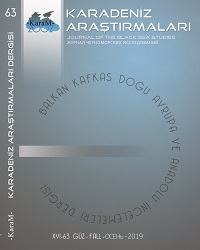Eski Uygur Türkçesi Budist Metinlerinde 108 Sayısı
108 Number in the Old Uyghur Buddhist Texts
Author(s): Hacer TokyürekSubject(s): Religion and science , Sociology of Religion, Turkic languages
Published by: Karadeniz Araştırmaları Merkezi
Keywords: 108 number; Buddhism; Old Uyghur; Macrocosmology; Microcosmology;
Summary/Abstract: Numbers which measure the whole universe as mathematical value contain cultural and religious various meanings. In this context, the number 108, as found in examples such as rosaries with 108 beads, the repetition of a dhāraṇī 108 times, or the repetition of the 108 name of Mañjusri Buddha in Old Uyghur, carries with it important numerical value because of its significance in Buddhism as well as other religions. When the number 108 in the Old Uyghur language is examined more closely, we seen that this number represents three different creations: (1) Universe, (2) World, and (3) Human. Firstly, in the creation of the universe, the distances between the sun, the earth and the moon are concerned. The second is the creation of the world, and it is linked to the golden ratio rule 108, an important rule in the world or in nature. Finally, the human body and spirit are associated with the number 108. The number 108 indicates the 108 pressure points in the human body and the distance between the body and the god. In addition, the number 108, which has mathematical and astronomical value is also tied astrology as well.
Journal: Karadeniz Araştırmaları
- Issue Year: 2019
- Issue No: 63
- Page Range: 531-540
- Page Count: 10
- Language: Turkish

